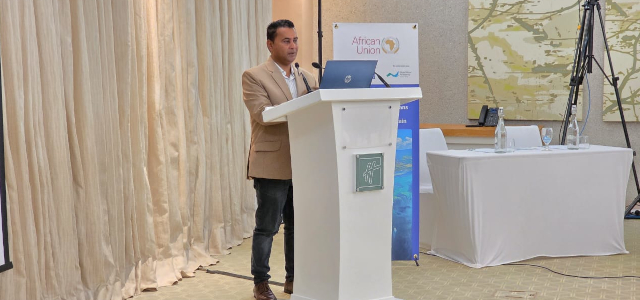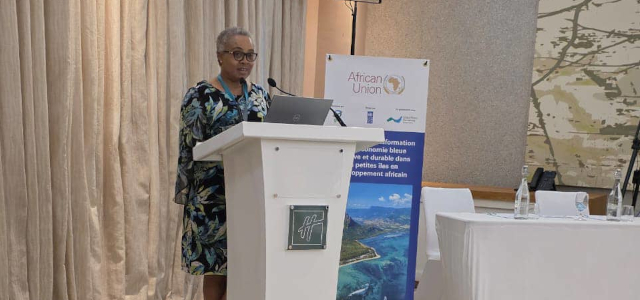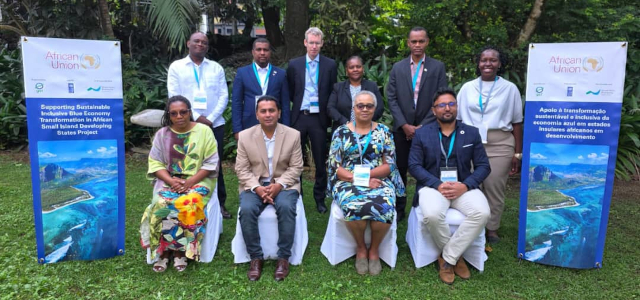The project, funded by the Global Environment Facility (GEF) and led by the United Nations Development Programme (UNDP) with the Global Water Partnership Southern Africa (GWPSA) as Executing Agency, will support Cabo Verde, Guinea-Bissau, São Tomé and Príncipe, Comoros, Mauritius, and Seychelles. The African Union Commission (AUC) serves as the project’s custodian.
Over 42 months, the UNDP-GEF project “Supporting Sustainable Inclusive Blue Economy Transformation in African Small Island Developing States", will strengthen governance frameworks, implement on-the-ground demonstrations to address unsustainable coastal practices, and promote integrated land management and knowledge sharing across the SIDS.
Mr. Oocheetsing Sadasing, Acting Principal Research Scientist at the Mauritian Oceanography Institute, highlighted the importance of science and collaboration.

He said: “As Island States, we rely heavily on the ocean for food, jobs and economic development. Yet we are also highly vulnerable to marine pollution, overfishing, land degradation, and increasing impacts of climate change. This workshop is an opportunity for us to come together, better understand the objectives of the project, agree on modes of collaboration, and clarify the rules of partners. It is an important step towards building stronger cooperation among countries, institutions, and communities.”
Dr. Olivier Pasnin, Programme Technical Specialist at the UNDP Mauritius and Seychelles, underscored the importance of the project during the opening of the Inception Workshop.
“Today marks a pivotal moment in our shared journey, a moment that underscores our collective ambition, as African SIDS, to transition towards a sustainable, inclusive, and climate-resilient blue socio-economic future.
“With an immense marine territory, including 2.3 million km² under the jurisdiction of the Republic of Mauritius and home to some of the world’s richest marine ecosystems, African SIDS hold tremendous potential to lead the way in blue economy transformation. Yet, turning this potential into prosperity is neither automatic nor guaranteed. Despite forward-looking strategies like the Africa Blue Economy Strategy, implementation remains a challenge. Fragmented governance, limited technical capacity, insufficient investment, and the escalating impacts of climate change continue to hinder progress and test the resilience of our marine and coastal systems,” explained Dr. Olivier Pasnin, UNDP Programme Technical Specialist.
The inception workshop brought together governments, regional partners, and civil society to align on strategy, finalise the first-year work plan, and establish a steering committee to guide implementation. Delegates also reviewed gender and stakeholder engagement strategies, monitoring and evaluation plans, and co-financing commitments.
The workshop was designed to provide a shared understanding of the project’s goals and objectives, clarify roles and responsibilities, and align all stakeholders on the way forward. Delegates reviewed the project’s strategy, validated its results framework, and agreed on the first-year work plan and monitoring approach.
Specific objectives of the workshop included:
- Familiarising stakeholders with the detailed project strategy and expected outcomes.
- Clarifying reporting, communication, and decision-making structures.
- Reviewing UNDP-GEF monitoring and evaluation requirements.
- Updating the project logframe, annual work plan, and budget.
- Raising awareness on gender equality, stakeholder engagement, and co-financing commitments.
Global Water Partnership Southern Africa reiterated its commitment to supporting the implementation of the project.

“The project sets out to demonstrate how African Island Nations can pioneer a sustainable and inclusive blue economy model that balances prosperity with ecological integrity. Its success will depend on strong partnerships, continuous innovation, and the engagement of communities, governments, and the private sector alike,” said Mrs Francina Phakameya, GWPSA Finance and Administration Director.
The project is anchored on 3 interlinked components:
- Sustainable Blue Economy and Land Degradation Neutrality enabling conditions - improved governance frameworks – Strengthening governance frameworks and creating enabling conditions for sustainable blue economy and land degradation neutrality.
- On-the-ground national demonstrations of Sustainable Investments - Implementing on-the-ground investments that address unsustainable ocean and coastal practices, while promoting integrated land management and restoration of degraded production landscapes.
- Knowledge Management and Upscaling - Building platforms for knowledge exchange, capacity development, and scaling up successful practices across the SIDS and beyond.
Through this project, the participating countries will work together and hold policy discussions at the continental level on how to manage the growing demand for ocean resources. The goal is to find ways to meet these needs in a way that protects the environment and includes the needs of people living in Small Island Developing States.
